Abstract
Operative neurosurgery has recently entered an exciting era of image guided surgery or neuronavigation and application of this novel technology is beginning to have a significant impact in many ways in a variety of intracranial procedures. In order to fully assess the advantages of image guided techniques over conventional planning and surgery in selected cases, detailed prospective evaluation has been carried out during the advanced development of an optically tracked neuronavigation system. Over a 2-year period, 300 operative neurosurgical procedures have been performed with the assistance of interactive image guidance, as well as the development of new software applications and hardware tools. A broad range of intracranial neurosurgical procedures were seen to benefit from image guidance, including 163 craniotomies, 53 interactive stereotactic biopsies, 7 tracked neuroendoscopies and 37 complex skull base procedures. The most common pathological diagnoses were cerebral glioma in 98 cases, meningioma in 64 and metastasis in 23. Detailed analysis of a battery of postoperative questions revealed benefits in operative planning, appreciation of anatomy, lesion location, safety of surgery and greatly enhanced surgical confidence. The authors believe that image guided surgical technology, with new developments such as those described, has a significant role to play in contemporary neurosurgery and its widespread adoption in practice will be realised in the near future.
Full text
PDF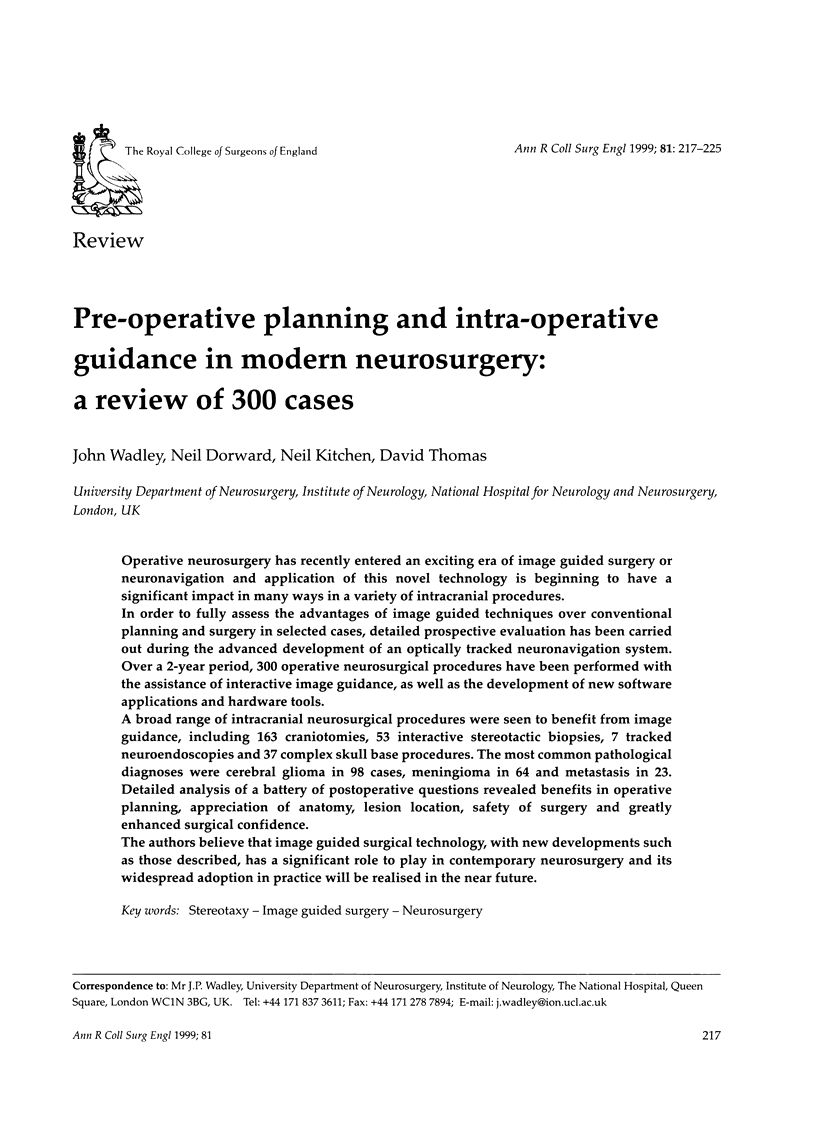

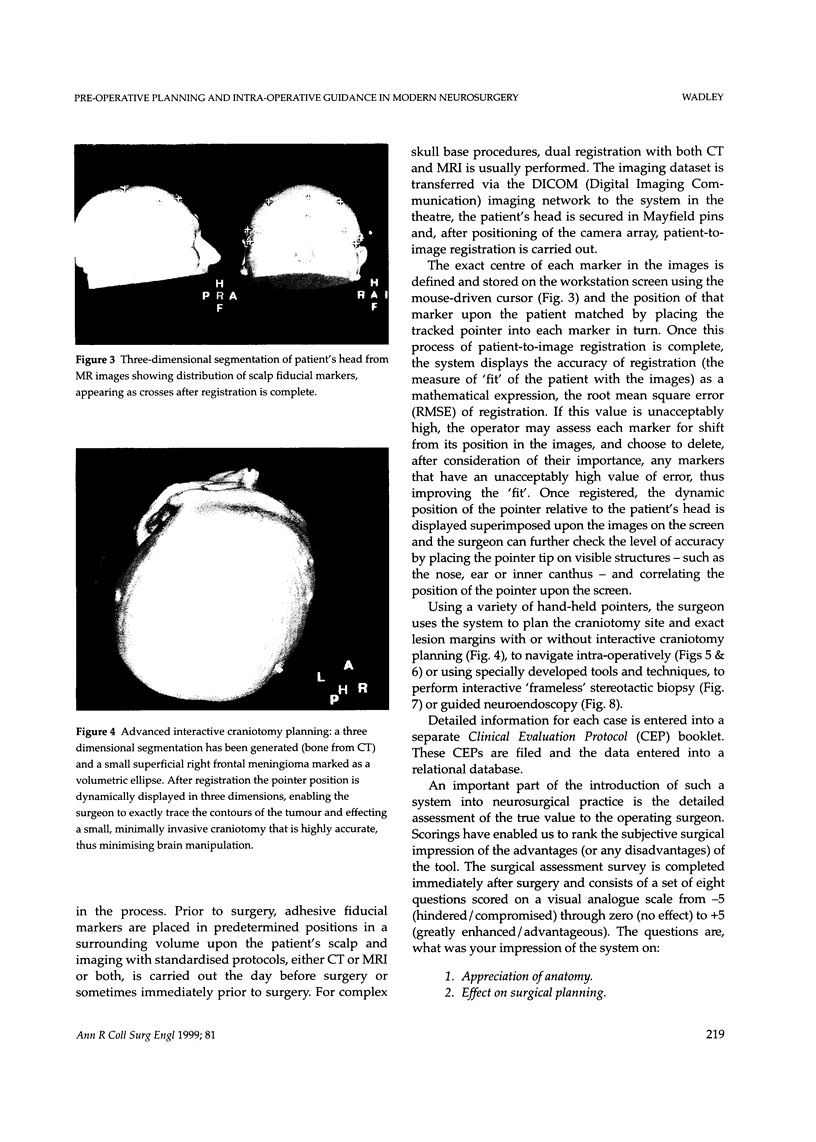
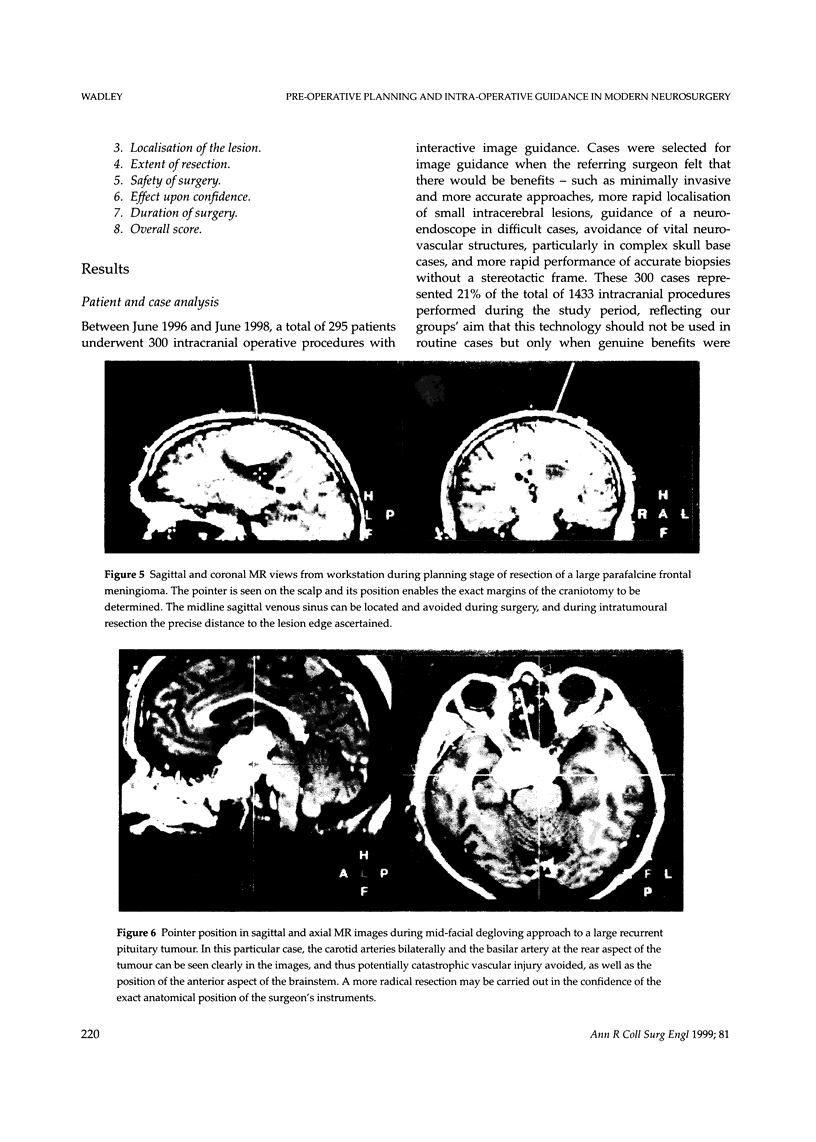
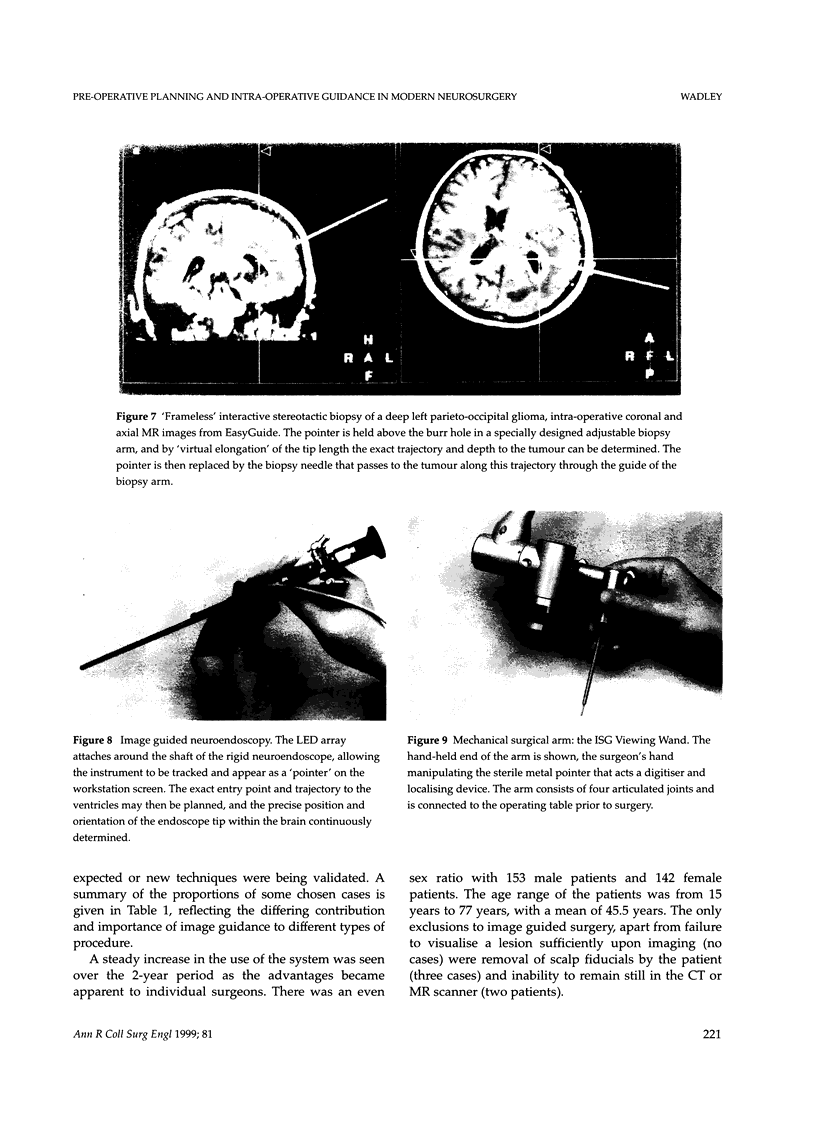
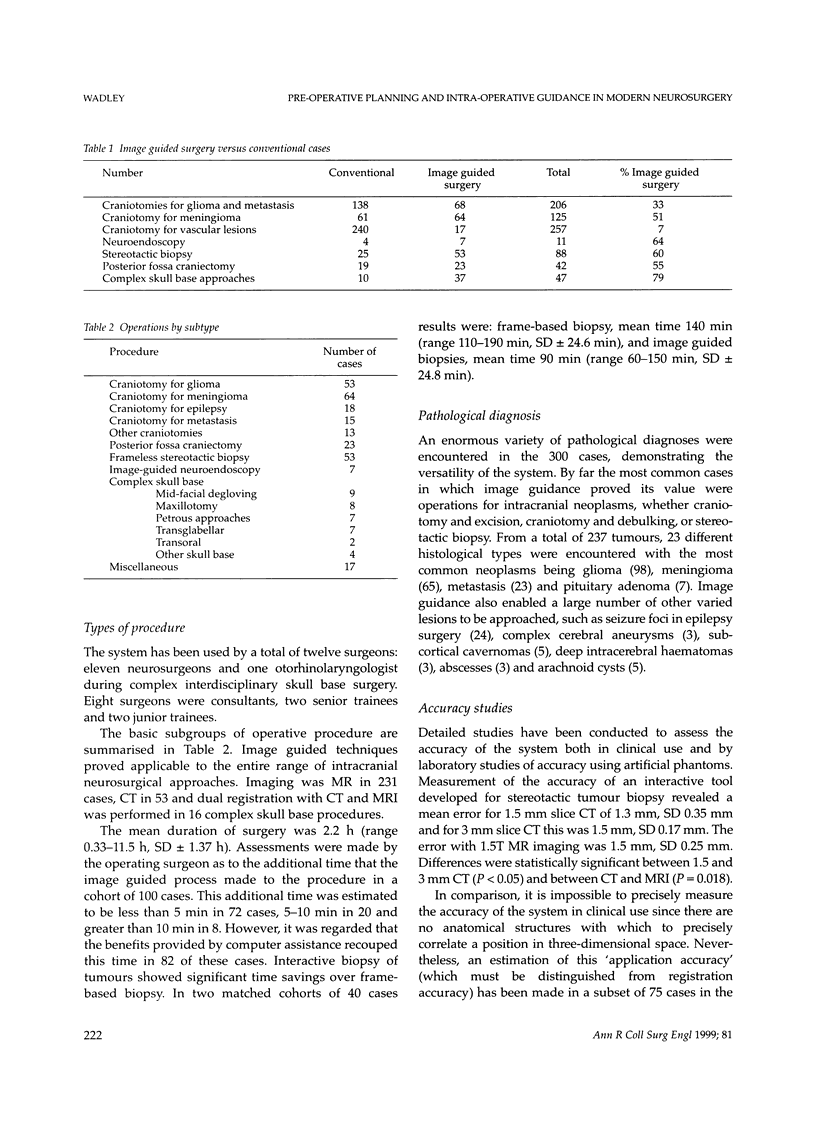


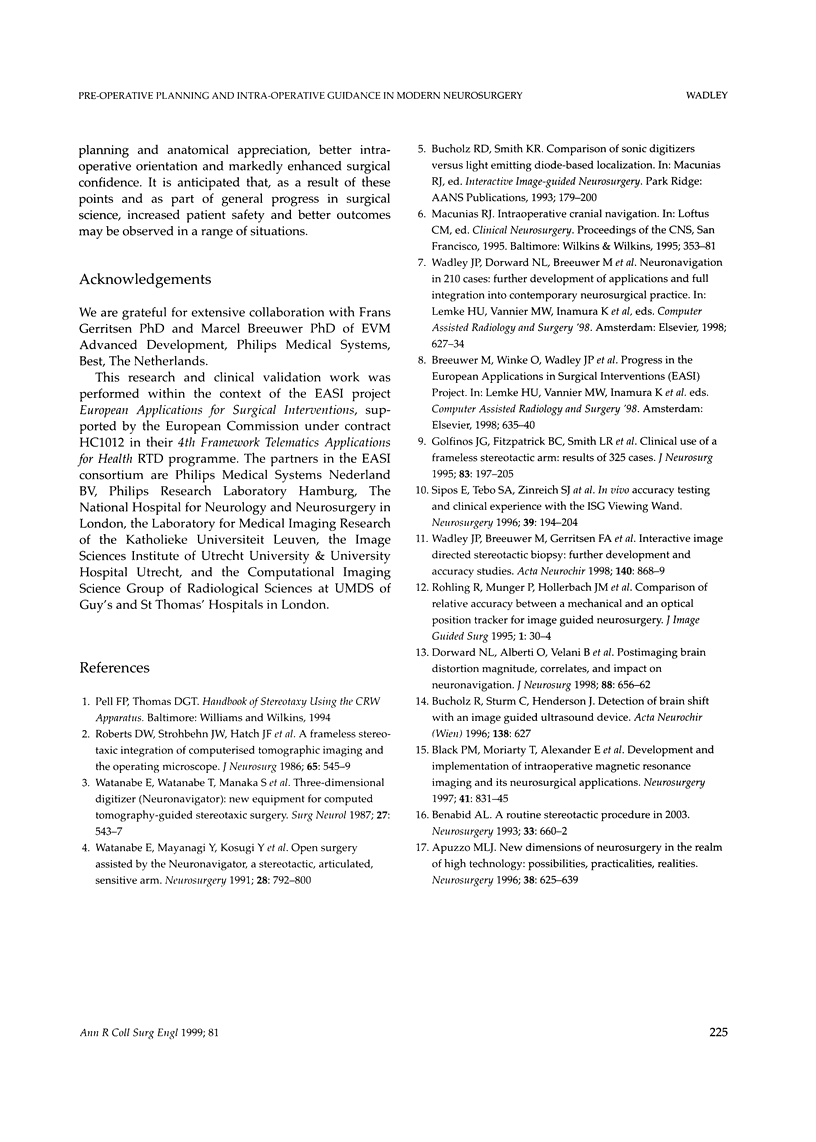
Images in this article
Selected References
These references are in PubMed. This may not be the complete list of references from this article.
- Apuzzo M. L. The Richard C. Schneider Lecture. New dimensions of neurosurgery in the realm of high technology: possibilities, practicalities, realities. Neurosurgery. 1996 Apr;38(4):625–639. doi: 10.1097/00006123-199604000-00001. [DOI] [PubMed] [Google Scholar]
- Benabid A. L. A routine stereotactic procedure in 2003. Neurosurgery. 1993 Oct;33(4):660–662. doi: 10.1227/00006123-199310000-00015. [DOI] [PubMed] [Google Scholar]
- Black P. M., Moriarty T., Alexander E., 3rd, Stieg P., Woodard E. J., Gleason P. L., Martin C. H., Kikinis R., Schwartz R. B., Jolesz F. A. Development and implementation of intraoperative magnetic resonance imaging and its neurosurgical applications. Neurosurgery. 1997 Oct;41(4):831–845. doi: 10.1097/00006123-199710000-00013. [DOI] [PubMed] [Google Scholar]
- Dorward N. L., Alberti O., Velani B., Gerritsen F. A., Harkness W. F., Kitchen N. D., Thomas D. G. Postimaging brain distortion: magnitude, correlates, and impact on neuronavigation. J Neurosurg. 1998 Apr;88(4):656–662. doi: 10.3171/jns.1998.88.4.0656. [DOI] [PubMed] [Google Scholar]
- Golfinos J. G., Fitzpatrick B. C., Smith L. R., Spetzler R. F. Clinical use of a frameless stereotactic arm: results of 325 cases. J Neurosurg. 1995 Aug;83(2):197–205. doi: 10.3171/jns.1995.83.2.0197. [DOI] [PubMed] [Google Scholar]
- Roberts D. W., Strohbehn J. W., Hatch J. F., Murray W., Kettenberger H. A frameless stereotaxic integration of computerized tomographic imaging and the operating microscope. J Neurosurg. 1986 Oct;65(4):545–549. doi: 10.3171/jns.1986.65.4.0545. [DOI] [PubMed] [Google Scholar]
- Rohling R., Munger P., Hollerbach J. M., Peter T. Comparison of relative accuracy between a mechanical and an optical position tracker for image-guided neurosurgery. J Image Guid Surg. 1995;1(1):30–34. doi: 10.1002/(SICI)1522-712X(1995)1:1<30::AID-IGS5>3.0.CO;2-N. [DOI] [PubMed] [Google Scholar]
- Sipos E. P., Tebo S. A., Zinreich S. J., Long D. M., Brem H. In vivo accuracy testing and clinical experience with the ISG Viewing Wand. Neurosurgery. 1996 Jul;39(1):194–204. doi: 10.1097/00006123-199607000-00048. [DOI] [PubMed] [Google Scholar]
- Watanabe E., Mayanagi Y., Kosugi Y., Manaka S., Takakura K. Open surgery assisted by the neuronavigator, a stereotactic, articulated, sensitive arm. Neurosurgery. 1991 Jun;28(6):792–800. doi: 10.1097/00006123-199106000-00002. [DOI] [PubMed] [Google Scholar]
- Watanabe E., Watanabe T., Manaka S., Mayanagi Y., Takakura K. Three-dimensional digitizer (neuronavigator): new equipment for computed tomography-guided stereotaxic surgery. Surg Neurol. 1987 Jun;27(6):543–547. doi: 10.1016/0090-3019(87)90152-2. [DOI] [PubMed] [Google Scholar]











